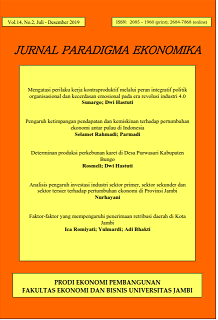Mengatasi perilaku kerja kontraproduktif melalui peran integratif politik organisasional dan kecerdasan emosional pada era revolusi industri 4.0
DOI:
https://doi.org/10.22437/paradigma.v14i2.8961Kata Kunci:
Politik organisasional persepsian, Kecerdasan emosional, Perilaku kerja kontraproduktifAbstrak
Perilaku kerja kontraproduktif merupakan fenomena umum yang menjadi masalah dalam sumber daya manusia. Perilaku tersebut dapat dipertimbangkan melalui faktor situasional dan individual. Situasi lingkungan tempat kerja yang mengandung unsur politik dan kemampuan individu yang memiliki kecerdasan emosional dapat menentukan perilaku kerja. Penelitian ini menguji pengaruh politik organisasional persepsian terhadap perilaku kerja kontraproduktif, serta menguji peran moderasi pada pengaruh tersebut. Pengujian dilakukan menggunakan data responden 200 karyawan yang bekerja pada perusahaan di kawasan industri Batam. Dengan menggunakan analisis regresi bertingkat hasil penelitian menunjukkan bahwa politik organisasional persepsian berpengaruh positif dan signifikan pada perilaku kerja kontraproduktif. Selanjutnya, kecerdasan emosional dapat memitigasi perilaku kerja kontraproduktif yang disebabkan oleh situasi politik organisasional. Penelitian ini memberikan manfaat secara praktis dalam mengatasi masalah perilaku kerja kontraproduktif.
Unduhan
Referensi
Bedi, A., & Schat, A. C. (2013). Perceptions of Organizational Politics: A Meta-Analysis of It’s Attitudinal, Health, and Behavioural Consequences. Canadian Psychology/Psychologie Canadienne, 54(4), 246-259.
Bennett, R. J., & Robinson, S. L. (2000). Development of A Measure of Workplace Deviance. Journal of Applied Psychology, 85(3), 349-360.
Berry, C. M., Ones, D. S., & Sackett, P. R. (2007). Interpersonal Deviance, Organizational Deviance, and Their Common Correlates: A Review and Meta-Analysis. Journal of Applied Psychology, 92(2), 410-424.
Bowling, N. A., & Burns, G. N. (2015). Sex as A Moderator of The Relationships Between Predictor Variables and Counterproductive Work Behavior. Journal of Business and Psychology, 30(1), 193-205.
Chang, K., & Smithikrai,C. (2010). Counterproductive Behaviour at Work: An Investigation Into Reduction Strategies. The International Journal of Human Resource Management, 21(8), 1272-1288.
Cohen, A. (2015). Fairness in the Workplace. UK: Palgrave Macmillan.
Cooper, D. R., & Schindler, P. S. (2014). Business Research Methods (12th ed.). New York: The McGraw−Hill Companies.
De Clercq, D., Bouckenooghe, D., Raja, U., & Matsyborska, G. (2014). Unpacking The Goal Congruence–Organizational Deviance Relationship: The Roles of Work Engagement and Emotional Intelligence. Journal of Business Ethics, 124(4), 695-711.
Ferris, G. R., & Hochwarter, W. A. (2011). Organizational Politics. In S. Zedeck, H. Aguinis, W. Cascio, M. Gelfand, K. Leong, S. Parker, & J. Zhou (Eds.), Handbook of Industrial and Organizational Psychology (435-459). Washington, DC: American Psychologycal Association.
Fox, S., & Spector, P. E. (2005). Counterproductive Work Behavior: Investigations Of Actors and Targets. Washington, DC: American Psychologycal Association.
Junaidi,J., Amri, A., & Hardiani, H. (2014). Potensi Klaster Agroindustri Usaha Mikro Kecil dan Menengah di Provinsi Jambi. Jurnal Perspektif Pembiayaan dan Pembangunan Daerah, 2(1), 9-20
Kiewitz, C., Restubog, S. L. D., Zagenczyk, T., & Hochwarter, W. (2009). The Interactive Effects of Psychological Contract Breach and Organizational Politics on Perceived Organizational Support: Evidence From Two Longitudinal Studies. Journal of Management Studies, 46(5), 806-834.
Latifah, L., & Wulansari, N. A. (2017). Pengaruh Kecerdasan Emosional pada Perilaku Lalai dengan Menggunakan Persepsi Politik Organisasional sebagai Variabel Pemediasi. Management Analysis Journal, 6(3), 351-362.
Matta, F. K., Erolâ€Korkmaz, H. T., Johnson, R. E., & Biçaksiz, P. (2014). Significant Work Events and Counterproductive Work Behavior: The Role of Fairness, Emotions, and Emotion Regulation. Journal of Organizational Behavior, 35(7), 920-944.
Meisler, G., & Vigoda-Gadot, E. (2014). Perceived Organizational Politics, Emotional Intelligence and Work Outcomes: Empirical Exploration of Direct and Indirect Effects. Personnel Review, 43(1), 116-135.
Robinson, S. L., & O'Leary-Kelly, A. M. (1998). Monkey See, Monkey Do: The Influence of Work Groups on The Antisocial Behavior of Employees. Academy of Management Journal, 41(6), 658-672.
Salancik, G. R., & Pfeffer, J. (1978). A Social Information Processing Approach to Job Attitudes and Task Design. Administrative Science Quarterly, 23(2), 224-253.
Salovey, P., & Mayer, J. D. (1990). Emotional Intelligence. Imagination, Cognition and Personality, 9(3), 185-211.
Vigoda, E. (2002). Stressâ€Related Aftermaths To Workplace Politics: The Relationships Among Politics, Job Distress, and Aggressive Behavior in Organizations. Journal of Organizational Behavior, 23(5), 571-591.
Vough, H. C., & Caza, B. B. (2016). Where do I go from here? Sensemaking and The Construction of Growth-Based Stories in the Wake of Denied Promotions. Academy of Management Review, 42(1), 103-128.
Weick, K. E., Sutcliffe, K. M., & Obstfeld, D. (2005). Organizing and The Process of Sensemaking. Organization science, 16(4), 409-421.
Whelpley, C. E., & McDaniel, M. A. (2016). Self-Esteem and Counterproductive Work Behaviors: A Systematic Review. Journal of Managerial Psychology, 31(4), 850-863.
Wong, C. S., & Law, K. S. (2002). The Effects of Leader and Follower Emotional Intelligence on Performance and Attitude: An Exploratory Study. The Leadership Quarterly, 13(3), 243-274.
Zamzami, Z., & Hastuti, D. (2018). Determinan Penerimaan Daerah dan Pertumbuhan Ekonomi Terhadap Pengembangan Ekonomi Kreatif di Provinsi Jambi. Jurnal Paradigma Ekonomika, 13(1), 37-45
##submission.downloads##
Diterbitkan
Versi
- 2019-12-31 (1)
- 2019-12-31 (1)









